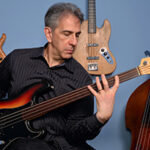Sometimes, that’s all you need
By Jon Liebman
March 3, 2023
In your quest for learning bass, what do you ultimately see yourself doing once you get “really good” on the instrument?
Are you clamoring for jaw-dropping technique that’s sure to blow everyone away?
Do you fantasize about getting your slapping chops so awesome that you’ll put Victor Wooten to shame?
There’s nothing wrong with aspiring to play like Victor, or for that matter, Jaco, Billy Sheehan, Jeff Berlin, Hadrien Feraud, or whatever other bass greats you admire.
But if that’s your main goal as a bass player, be careful. You could be on your way to making yourself very unpopular.
You might be making it too complicated
I’m not saying I don’t have respect and admiration for those players. I absolutely do, along with so many others.
But if the flashy, pyrotechnic, acrobatic, chop-infused, crowd-pleasing stuff was all they did, they’d have a hard time getting the right kind of respect, the respect that comes from functioning in the true role of a bass player, understanding the job, and giving the music what it needs.
Those guys get my respect because – and this is key – they know how to take care of business as bass players.
I had a great conversation with Dave Marotta recently, published as this week’s FBPO interview.
During our talk, Dave told me about a bass player he saw recently who just blew him away. This guy, who Dave says looked like he was in his twenties, didn’t have that effect on him because of his awesome chops. It was because of the way he supported the band and the way he took care of business.
“He sat down,” Dave says, “and the tone and the feel this guy got… he just blew my mind. Musicality, all the groove…”
I always find it so uplifting to hear about a bass player that approaches music in that way. This time it was especially refreshing to hear a description like that about a guy in his twenties. “He just spoke to me,” Dave says, “because that’s the way I play.”
Dave’s Burt Bacharach story
“I’m known for my great whole notes and half notes,” Dave says with a laugh. “The power of a whole note is so huge. I got that from Burt Bacharach.”
It so happens that my interview with Dave took place just 8 days before Bacharach’s death. “I worked with him for about 4 years,” Dave says. “I loved his songwriting and what he expected about bass players.”
As Dave tells it, Bacharach had a definite opinion about what he liked – and didn’t like – about bass players.
“‘So many bass players come in and they’re just so busy,’” Dave recalls Bacharach telling him. “He says, ‘You know, you can just play a whole note and listen to the lyric and then decide whether you need to add something else, because maybe you don’t.’”
Truer words were never spoken.
It’s about what’s going to help the song
As a bass player, you need to lock in with the drummer, set the foundation for the band, and make the music feel good.
Sometimes that means playing a crazy, 16th-note infused, super busy, funky R&B line.
Other times, it means just playing a whole note.
You need to be sensitive enough to know the difference and accomplished enough to know how to provide what’s needed.
“And of course, create space,” Dave adds. “We’ve all talked about that. What’s the groove? Well, the groove’s maybe not the notes you play; it’s the ones you leave out.”
How are you going to make that happen?
Having interviewed just about 800 bass players, I’ve gotten to hear a lot of “bass wisdom,” which I’m happy to pass along to you every week. I hope you’re paying attention. More importantly, I hope you’re making an effort to implement some of this wisdom into your bass playing.
Good bass technique is important. Jaw-dropping chops are cool, provided you’re disciplined enough to keep them in your back pocket, only pulling them out when they’re genuinely going to help the song.
Want to learn more?
The lessons and courses in the Bottom Line Club membership, right here at For Bass Players Only, are built using my own one-of-a-kind framework, where you’ll learn the proper role of the bass player and get the tools to make the music feel good and totally groove.
Even if that means just playing a whole note.
Find out all about joining the Bottom Line Club here.
Let’s play bass!
Jon






Great stuff Jon. It’s so seductive watching “super-chops” players that we can easily get sucked in to chasing the wind. Burt Bacharach’s comment brings us back to reality… if we listen. Thank you for bringing us these great pearls of wisdom from people who know what excellent bass playing really is. And how encouraging to hear Dave Marotta talk about a player who was only in his twenties and had figured it out. There’s hope! At the end of the day it comes down to ego: are we going to let it win or are we going to put it in its place? Letting it win is like letting an eight year old drive the bus.
That’s a great way to look at it, Grayden. Thanks for weighing in!
Agree playing the Bass in a band is all about locking the groove down.
You got it, Marcus. Thanks!
My set this weekend, my first gig as a bassist, has songs that go for minutes with just whole notes and then launch into 8/8! Another song is ALL whole notes (though I do throw in a few phrasings to try to keep it interesting). Playing whole notes takes great discipline, focus and dedication for me, at least! Discipline, because we want to play what we know how to play, which often is not best for the song. Focus, because…well, have you played a song lately with all just whole notes….it’s easy to let one’s mind wonder! Dedication, because though we know far more technically than how to play whole notes, and would love the audience to see what we are capable of…in truth, we’re there to support the needs of the song. In other words, we’re dedicated to making the supporting musicians and hence, the song, sound great.
Right on, Sklyflyer. I’d say what you’re addressing is the need for discipline and musical maturity. I have no doubt the others like having you in the band. I would!
I agree completely, as a bassist myself I strive to hold down the bottom end while keeping the harmony outlined as well as I can. I think for the most part the bass is underlying and deeper in the mix, less heard than felt, a warm bond intertwining the rhythm and harmony, kind of the drums and guitar together, functioning in between, and heard more sublimely but still heard ntl, with deeper tone not so much “trebled out.” However, there is still room for flair but better kept to minimal. I can appreciate some advanced playing, nothing wrong with it, but ultimately the bass function sits “behind” melody, holding down the its place, back in the mix, its position in the musical “structure.”
Thanks, Mike. You’ve definitely got the right attitude about being a bass player!
I have some dumb questions:
What is a groove?
What is chops? I’ve heard trumpet players say they lost their chops. I
always thought they lost their embouchure.
Joyce, there’s no such thing as a dumb question. Think of groove as the way you make the music feel. You want to sound not like you’re playing notes, but like you’re making music. Generally, if the music feels good, it grooves. It doesn’t matter what style you’re playing; groove applies to all types of music. There are rock grooves, jazz/swing grooves, shuffle grooves, blues grooves, etc.
Chops generally refers to technical proficiency on the instrument. Someone with a strong command of the instrument, often with the ability to play fast, is said to have chops. There is a slight twist on the definition for brass players (lips, embouchure, etc.), but in the end chops still refers to your musical ability on the instrument.
While having some level of chops is important for all instrumentalists, it’s a skill that must be used responsibly. In other words, you shouldn’t play something simply because you can; only do it if it genuinely helps the song.
Thanks for asking, Joyce. I hope that helps.
I invite others to weigh in as well.
I’ve been playing bass since the sixties and I find that this is hard for young players to except whole notes. I’m playing guitar right now cause the venue already has a bass player. Sometimes he does runs that don’t even go with the song or even worse scale, it can be awful. I’ve tried to show him some simple minor moves and sevenths but he seems to get deer in the headlights look and just don’t get it. But he does fine if he just stays in key and does not try to get fancy. By the way he uses tabs that he follows which is fine but I really believe he does not practice between gigs. If he doesn’t have tabs he can’t follow very well at all. I wish I could help him.
Thanks for sharing your story, John. It sounds pretty frustrating. Hopefully, the guy will get it some day.